DULLES, Va. – Donald Trump’s Inauguration weekend will include the traditional swearing-in ceremony, parade and galas, but security will be more intense this year as officials prepare to protect the new president and an anticipated crowd of 800,000 to 900,000 from new threats: weaponized drones, thousands of protesters, terrorists, trucks plowing through crowds and cyberattacks.
There is nothing “off-the-shelf” about 2017’s inauguration security plans, Assistant Special Agent in Charge Christopher Caruso from the U.S. Secret Service said at a private briefing recently. More than 28,000 law enforcement and military personnel will be involved, from the National Guard, U.S. Secret Service, Capitol Police, U.S. Park Police, FBI, Transportation Safety Administration and the Federal Aviation Administration.
The effort will be headquartered at the Multi Agency Communication Center in northern Virginia, where dozens of experts from local and federal agencies will monitor the events, starting with Thursday’s wreath-laying ceremony at Arlington National Cemetery and ending at the prayer service at the Washington National Cathedral on Saturday. Security coverage will not include the Women’s March on Washington protest Saturday because it is not an official part of the Inauguration.
The throngs attending the Inauguration will see more of everything – concrete barriers and checkpoints – as well as new methods, such as using trucks as blockades.
“The global terror environment is very different even from 2013,” Homeland Security Secretary Jeh Johnson said. “We have to be concerned about individual acts of violence.”
Caruso noted another threat: “unmanned aerial systems that can be used as a weapon.”
Though drone flights are banned from airspace in the District of Columbia, Johnson said unauthorized flights are “something we have planned for, and there is technology to deal with it.” He did not elaborate on what the technology is.
Johnson said the agencies were “doubling down” to prevent attacks similar to those in Nice, France, and in Berlin last year, where terrorists drove trucks into crowds of people. Dump trucks, buses and cement trucks will act as barriers, lining the streets to fortify the “hard perimeter areas,” zones barred to nongovernment vehicles.
“We’ve got to be vigilant, we’ve got to plan, we’ve got to prepare,” he said.
Although terrorists and “lone wolf” extremists are top concerns, security forces are also prepared to handle the high number of protesters expected. Ninety-nine groups have applied for demonstration permits, 10 times the average at past inaugurations, officials said. At least 63 of them are scheduled to demonstrate on Friday.
“As long as they are nonviolent, [protesters] will be allowed to exercise their First Amendment rights,” Johnson told reporters.
Caruso agreed, saying “what we do limit is the size or type of signs or demonstration aids that people bring in, particularly if they can be used in a harmful or threatening manner.”
Online threats to “shut down” inaugural events have factored into the overall security preparations, Johnson said.
U.S. Park Police have taken steps to separate opposing demonstrations and prevent clashes, Park Police Deputy Chief Scott Fear said. Conflicting protest groups have been placed in different locations on the mall and will be monitored by law enforcement personnel.


